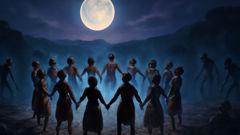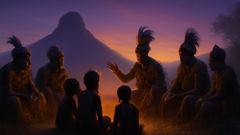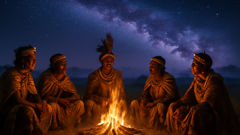Introduction
The vast grasslands of southern Africa have always whispered secrets on the wind—stories older than memory, carried by the rivers and woven through the roots of ancient baobabs. In the cradle of the Zulu people, where mountains rise in layered blue and the horizon trembles with the haze of distant heat, legends are not mere tales but living echoes of forgotten epochs. Among these stories, none is more enigmatic or profound than the saga of the Chitauri—the mysterious reptilian star beings said to have descended from the heavens before the first dawn. For generations, elders have gathered beneath the trembling stars, their voices braiding myth with memory. The Chitauri, as described by the Zulu, were neither gods nor spirits but something more unsettling: cosmic interlopers, with gleaming scales and burning eyes, whose arrival from the dark spaces between worlds marked the beginning of a new era for humankind. They came not in peace, the stories say, but with purpose: to shape, to rule, to bind the destiny of Earth to their own unfathomable design. These tales do not belong to dusty tomes or distant scholars alone. They live in the heartbeats of every fire-lit gathering, in the rhythms of drums that echo across the veldt. The myth of the Chitauri is at once a warning, a mystery, and a testament to the resilience of the human spirit in the face of forces that seem both wondrous and terrifying. To walk the path of this legend is to step into a world where the boundary between earth and sky blurs, where courage and fear are as old as starlight, and where the fate of humanity hangs in a delicate balance between freedom and domination.
The Arrival: When the Stars Fell to Earth
Long before spears were forged or cattle roamed the grasslands, the world lay in a state of wild innocence. The ancients called this time Uhlanga, the primal beginning, when the earth was soft and the sky pressed close, its mysteries visible even in daylight. One night, as the village of Isandlwana slept, an unnatural silence swept across the land. The stars seemed to tremble, growing brighter and more restless with each passing moment. Then, without warning, a river of fire tore across the heavens, splitting the darkness with its terrible light. Villagers stumbled from their huts, eyes wide with fear and awe, as the celestial blaze arced toward the distant mountains and vanished beyond the horizon.

The elders later said that was the night when the Chitauri came. In the days that followed, strange signs spread across the land. The cattle grew restless, refusing to graze near certain groves. Rivers glittered with a faint, silvery sheen at dusk. Children found smooth, egg-like stones embedded in the riverbeds, warm to the touch and humming with an energy that sent shivers up their spines. Even the birds’ songs seemed altered—melancholy, laced with a warning none could decipher.
It was a boy named Sipho who first saw them. He’d wandered farther than he should have, following a wounded antelope into the low foothills, where mist clung to the ground in ghostly shrouds. There, at the edge of a hollow, he beheld the impossible: tall figures, cloaked in shimmering darkness, their scales catching the faintest hints of dawn. Their eyes glowed with an inner fire, not quite gold and not quite red. They moved with deliberate slowness, as if gravity itself bent to their will. Sipho stood frozen, heart thundering, until one of the beings turned to him. In that gaze, he felt a wordless command—a weight pressing upon his thoughts, sifting through his memories and dreams. When he awoke, trembling in his grandmother’s hut, he could not recall how he’d returned. But he remembered the voice that had spoken in his mind: 'We are the Chitauri. The world is ours.'
Panic spread quickly as more villagers reported sightings. The Chitauri never spoke aloud, but their presence was unmistakable. Wherever they walked, the earth itself seemed subdued. Crops withered without reason; dogs cowered and refused to bark. The elders called for a gathering beneath the ancient fig tree. Wise old Nkosana, whose hair was as white as mountain mist, recited the songs of origins. 'We are not alone,' he declared, voice trembling with both fear and awe. 'The ones from the sky walk among us, and their intentions are hidden as the moon in daytime.'
Rumors soon grew into conviction. The Chitauri had come to enslave humanity, to sap its will and twist its future for their own unknown ends. Some believed they sought gold, that rare and sacred metal said to be food for their star-born machines. Others whispered that the Chitauri desired something deeper: to bend the human spirit, to sow confusion and discord so that people would forget their own power. At night, mothers sang new lullabies—half prayers, half warnings—to ward off the cold eyes they felt watching from the dark. Yet, even as fear grew, so did a spirit of resistance. The seeds of rebellion took root beneath the surface, and a new chapter in the Zulu story began to unfold.
The Reign of Shadows: Chitauri Domination and Human Defiance
In the seasons that followed, life changed in ways both subtle and profound. The Chitauri did not build cities or demand tribute in the manner of earthly conquerors. Their rule was invisible yet absolute, enforced through an eerie influence that crept into the thoughts and actions of the people. The Zulu called it "umoya omnyama"—the dark wind—a presence that whispered doubts and sowed divisions among friends and kin.

Village councils grew distrustful, quarrels erupting over petty matters that once would have been settled with laughter or song. Crops failed for no reason; once-healthy children fell ill with ailments unknown to any healer. Shamans and dreamwalkers reported visions of immense, star-clad serpents coiling around the land, their eyes glowing with triumph as humanity bowed in silence. The Chitauri appeared rarely, but their shadow fell over everything.
Yet amid this oppression, hope endured. A young woman named Thandiwe became a symbol of resistance. She was known for her courage and her voice, which rang clear as mountain water. One night, guided by a dream of her ancestors, Thandiwe climbed to the highest ridge where the air was thin and the wind smelled of freedom. There, she encountered the Chitauri face to face. They offered her a vision: a world remade in their image, where all were subservient and ambition served only their cosmic designs. But Thandiwe refused. Her refusal was a spark in the darkness—a signal that the human spirit could not be fully subdued.
Word of her defiance spread like wildfire. Secret gatherings blossomed in caves and forests, far from the eyes of the Chitauri. Songs once forbidden were sung again, their rhythms echoing the heartbeat of resistance. The old stories—the ones of bravery, unity, and cunning—were revived and shared among children and elders alike. The people remembered who they were: not just subjects but keepers of the land and sky.
In retaliation, the Chitauri unleashed their most insidious weapon: dreams. Each night, villagers suffered visions of endless captivity and despair. But Thandiwe, guided by ancestral wisdom, taught her people how to reclaim their sleep—how to transform nightmares into messages, warnings into strength. The Chitauri’s grip weakened, their frustration mounting as the Zulu spirit proved more resilient than expected.
The climax came during a night of celestial alignment, when the stars danced in patterns unseen for generations. The people gathered atop Isandlwana Hill, singing and drumming beneath a full moon. Their voices formed a shield, a barrier the Chitauri could not breach. For the first time, the star beings faltered. Their forms flickered, edges blurring as if unraveling under the weight of human unity.
In a final confrontation, Thandiwe stood before the Chitauri’s leader—a being called N’gali, whose scales shimmered with all the colors of the void. She spoke not in fear, but with the authority of one who remembers her place in the world. 'We are not yours to command,' she declared. 'Our spirits are not for sale.'
At her words, the assembled people joined hands and chanted the ancient names of their ancestors, calling upon every river, mountain, and wind. The land itself responded: a deep tremor shook the ground, and a blinding light erupted from within the earth, engulfing the Chitauri in a storm of energy. When the light faded, the star beings were gone—cast back into the darkness between worlds.
Legacy of the Chitauri: Memory, Freedom, and the Wisdom of Ancestors
With dawn came relief and uncertainty. The Chitauri had vanished, leaving no trace save for altered dreams and stories etched into memory. The people knew the world was forever changed. Some whispered that the star beings had been banished for good; others feared their return with each shooting star or shiver of wind in the grass. Yet hope flourished in the aftermath—hope born from unity and the rediscovered strength of tradition.

Thandiwe became a revered elder, her story woven into every fire-side gathering. She taught that true freedom comes not from weapons or might, but from remembrance: of who one is, of where one comes from, and of the bonds that link people to land and to each other. She urged her people never to forget the lessons of the Chitauri—the dangers of division, the power of unity, and the wisdom hidden in dreams.
The tale of the Chitauri spread beyond Zulu lands, carried by traders and wanderers into distant valleys and foreign courts. It became a parable for all who heard it: a warning against those who seek to control through fear and deception, and a reminder that even the greatest shadow cannot quench the light of a united people.
Years passed into centuries, and Isandlwana Hill grew into a place of pilgrimage. Children climbed its slopes, listening to the wind for echoes of ancient songs. Elders recited the old verses, keeping memory alive. Some claimed that on certain nights, when the stars aligned and the moon hung low and red, a faint shimmer could be seen on the horizon—the lingering trace of the Chitauri’s passage.
But above all, the legend endured as a call to vigilance and hope. The people remembered: no force from beyond, however mighty or cunning, could erase the spirit of those who stand together. The Chitauri myth became part of the Zulu soul—living proof that stories are more than entertainment; they are shields, compasses, and bridges across generations.
And so, beneath the timeless sky, as fires burn and children drift into sleep, the saga of the Chitauri is told anew. It lives in every whispered prayer, every shared meal, every act of kindness and courage. It endures as a testament to freedom and to the enduring mystery of the stars.
Conclusion
The myth of the Chitauri is not just an old tale whispered by firelight; it is a living current that runs through the heart of the Zulu people and beyond. It reminds us that humanity’s greatest battles are not always fought with weapons, but with memory, unity, and resolve. In an age where new powers and technologies threaten to shape our destiny from unseen heights, the legend asks us to look inward—to remember who we are, to honor our ancestors, and to find strength in community. The stars may hold mysteries beyond our comprehension, and forces may come that seek to rule or reshape us, but as long as we gather together, listen to one another, and cherish our stories, no darkness—no matter how ancient or vast—can truly claim the world as its own.













